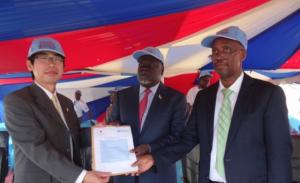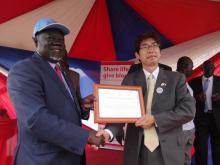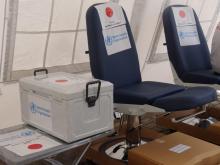South Sudan Commences World Blood Donor Day (WBDD) 2016 Celebrations
Under the theme “Blood Connects Us All”, South Sudan has joined the rest of the world to celebrate this year’s World Blood Donor Day to acknowledge the crucial role that voluntary blood donors play in saving millions of lives worldwide.
Share life Give Blood is the message behind the massive voluntary blood donation campaign carried out by the NBTS and partners to celebrate WBDD.
The event was kicked off on 13th June with TV and Radio talk shows in Juba. Challenges in the context of the country and achievements so far related to blood safety, voluntary blood donation and its impact were discussed in different fora.
On 14 June, the WBDD celebration commenced at the National Blood Transfusion Services (NBTS) in Juba and was graced by the presence of Honorable Dr Riek Gai Kok, Minister of Health, Republic of South Sudan; H.E. Mr Masahiko Kiya, the Japanese Ambassador; Dr Abdulmumini Usman, the World Health Organization Country Representative; Mr. Antonio Wani, the Acting Representative of the South Sudan Red Cross; Dr Makur M. Kariom, the Undersecretary at the Ministry of Health and officials of the Ministry of Health, volunteers, members of the blood donation and recipient communities among others.
The activities to herald the day included marching, musical interlude, speeches, handover of the first batch of medical equipment, drama on blood donation and the climax of celebration at the NBTS. The campaign highlighted stories from people whose lives has been saved through blood donation and the dimension of "sharing" and "connection" between blood donors and patients, as a way of motivating regular blood donors to continue giving blood as well as to motivate people in good health who have never given blood, particularly young people, to begin doing so. Blood donors were recognized and honored with bronze, silver and gold badges with the message, Share life Give Blood.
Mr Michael Lasuba, the Acting DG of Public Health Laboratory and National Blood Transfusion Services (PHL/NBTS) opened the ceremony with welcome remarks and by thanking all blood donors for their generous act of saving so many lives, particularly those of pregnant women.
On behalf of the Director General of the PHL/NBTS, Dr Lul Lojok Deng, the keynote address was delivered by Mr Angelo Ngor, from the PHL. He highlighted the history of the National Blood Transfusion Services, which began in 2014 and has since gone from strength to strength, despite challenges they have been faced with. He also noted that, “we at the blood bank, every year at this time, try to appreciate our donors by doing something for them, because we know we cannot replicate blood. The only way we can get it is by voluntary donation and it is life”.
“The need for blood transfusion in the health facilities is increasingly high due to the high number of obstetric complications needing transfusion, malaria, anemia in children, surgical operations and also with increasing number of trauma,” said Dr Abdulmumini. South Sudan is one of the countries that depend on blood donations from family members and friends of patients requiring blood. “This is why we must all become multipliers in order to increase the number of voluntary donors," Dr Abdulmumini underscored.
“Giving blood voluntarily is the highest form of solidarity a person can show, as it is not only responding to a humanitarian emergency needs but also building the proper foundation to complement long-term development of the country” said H.E Mr Masahiko Kiya , at the opening of the blood drive in Juba.
In his speech the Honorable Minister for Health Dr Riek Gai Kok, commended the contributions of the people of Japan and the commitments of WHO and other partners for the efforts to have safe, voluntary donated blood products. As we all join to commemorate World Blood Donor Day, let us all as a people with a common destiny campaign for a voluntary blood donation to enhance a healthy population, urged Dr Kok. He also highlighted that “the best way to be a friend is to give blood. So if you want to be a good friend to others, give the gift of life".
WHO with funding from the Government of Japan, has been providing support to expand and consolidate the blood safety programme so as to establish efficient and sustainable national blood transfusion services that can assure the quality, safety and adequacy of blood and blood products to meet the needs of deserving patients since 2014. A comprehensive situation analysis was done, standards, guidelines, blood policy and plan and provision of technical support to its implementation has been provided by WHO through the years. To improve access to the services, two blood banks have been established to cover the transfusion needs of hospitals in Juba and Wau.
Appreciation certificates were presented to milestone institutions/organizations including WHO for mobilizing their staff to donate blood.
Every year, World Blood Donors Day is celebrated on 14 June, the birthday of Dr Karl Landsteiner (14 June 1868 – 26 June 1943) who discovered the human ABO blood group system, paving way for successful transfusions. [It is notable that Dr Landsteiner also discovered the polio virus in 1909 with Constantin Levaditi and Erwin Popper.]
___________________________________________________
For more information, please contact:
Mr James Chitsva - +211954991637; chitsvaja [at] who.int (chitsvaja[at]who[dot]int)
Dr Moses Mutebi - +211955045050; ngandam [at] who.int (ngandam[at]who[dot]int)
Ms Jemila M. Ebrahim - +211950450007; ebrahimj [at] who.int (ebrahimj[at]who[dot]int)








